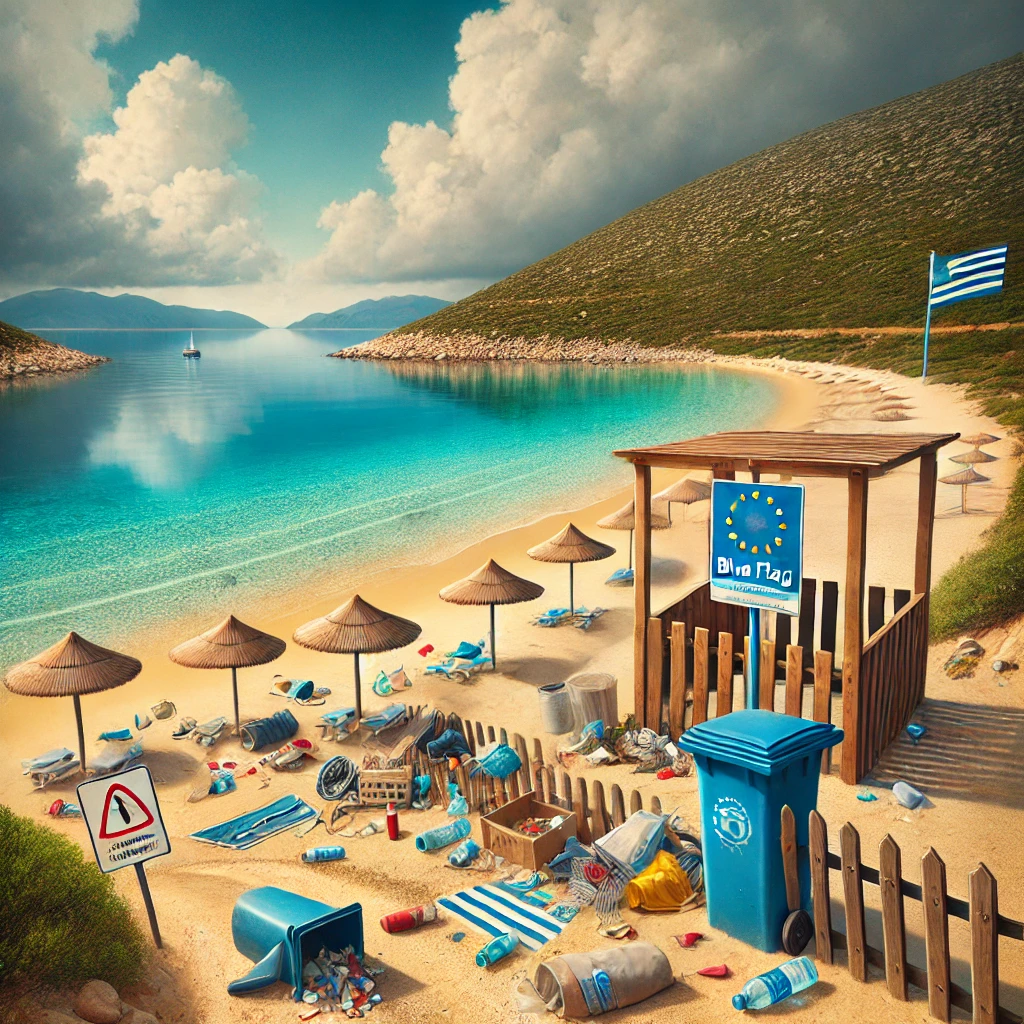
Greece is world-renowned for its pristine beaches, crystal-clear waters, and vibrant coastal ecosystems, making it a top destination for tourists. Among the most prestigious accolades for Greek beaches is the Blue Flag certification, a globally recognized award given to beaches and marinas that meet high standards of environmental management, water quality, and safety. However, recent news about Blue Flag Greek beaches lost has sparked widespread concern among locals, tourists, and environmental advocates.
In this article, we’ll explore the reasons why some Greek beaches have lost their Blue Flag status, the implications for the tourism industry, and the importance of preserving these natural treasures for future generations.
What Is the Blue Flag Certification?
1. Overview of the Blue Flag Program
The Blue Flag Program, launched by the Foundation for Environmental Education (FEE) in 1987, is an international certification awarded to beaches, marinas, and sustainable boating tourism operators.
- Criteria: To earn a Blue Flag, beaches must meet stringent criteria across four main categories:
- Environmental Education
- Water Quality
- Environmental Management
- Safety and Services
- Global Recognition: Over 5,000 beaches and marinas in 49 countries have received Blue Flag certification, making it a hallmark of excellence in coastal destinations.
2. Importance for Greek Beaches
Greece has consistently ranked among the top countries for Blue Flag beaches, with over 600 certified beaches in 2023.
- Tourism Appeal: The certification is a major draw for international visitors seeking clean, safe, and environmentally friendly destinations.
- Environmental Commitment: Blue Flag status reflects Greece’s commitment to preserving its natural beauty and protecting its coastal ecosystems.
Blue Flag Greek Beaches Lost: What Happened?
1. Beaches Losing Certification
In 2024, several prominent Greek beaches failed to maintain their Blue Flag certification due to lapses in meeting the required standards.
- Environmental Issues: Pollution, overdevelopment, and mismanagement were cited as the main reasons for the loss of certification.
- Affected Regions: Popular tourist destinations, including parts of Halkidiki, Crete, and the Cyclades, were among the areas affected.
2. Key Reasons for Loss of Certification
The loss of Blue Flag status can be attributed to several factors:
- Declining Water Quality: Increased pollution from untreated wastewater and agricultural runoff has impacted water quality in some areas.
- Overdevelopment: The rapid expansion of tourism infrastructure, such as hotels and resorts, has led to environmental degradation.
- Neglect of Maintenance: Failure to maintain basic facilities, such as clean restrooms, lifeguards, and proper waste disposal, also contributed to the loss.
- Ecosystem Disruption: Overcrowding and activities like boating, fishing, and construction have disrupted local ecosystems.
Also Read: Emmerdale: Tom King and Belle Dingle’s Love Story and Latest Drama
The Environmental Impact of Losing Blue Flags
1. Threats to Coastal Ecosystems
The loss of Blue Flag certification is a red flag for the health of Greece’s coastal environments.
- Marine Pollution: Poor waste management and untreated sewage pose serious risks to marine life.
- Habitat Destruction: Overdevelopment threatens fragile ecosystems like sand dunes and seagrass meadows.
2. Long-Term Consequences
- Biodiversity Loss: The degradation of coastal habitats can lead to a decline in marine species, many of which are vital to the ecosystem.
- Climate Change Vulnerability: Damaged ecosystems are less resilient to the effects of climate change, including rising sea levels and stronger storms.
Economic and Tourism Implications
1. Impact on Tourism
Tourism is a cornerstone of Greece’s economy, contributing nearly 20% of the country’s GDP. The loss of Blue Flag certifications can tarnish the reputation of affected regions.
- Tourist Preferences: Many international tourists prioritize destinations with Blue Flag status, viewing it as a guarantee of quality and cleanliness.
- Competition from Other Countries: Competing Mediterranean destinations like Spain and Turkey could attract visitors seeking certified beaches.
2. Financial Losses
- Decline in Revenue: Local businesses, including hotels, restaurants, and tour operators, may face revenue losses due to reduced visitor numbers.
- Increased Cleanup Costs: Restoring beaches to Blue Flag standards requires significant financial investment in infrastructure and environmental management.
Efforts to Restore Blue Flag Status
1. Government Initiatives
The Greek government has pledged to address the issues that led to the loss of Blue Flag certifications.
- Improved Waste Management: Investments in sewage treatment plants and waste disposal systems aim to reduce pollution.
- Sustainability Projects: Initiatives like coastal reforestation and marine conservation programs are being implemented to restore ecosystems.
2. Local Community Involvement
Local communities and businesses are also playing a crucial role in restoring their beaches to Blue Flag standards.
- Beach Cleanup Drives: Organized by local volunteers, these efforts aim to remove litter and pollutants from affected beaches.
- Sustainable Practices: Resorts and restaurants are adopting eco-friendly practices, such as reducing single-use plastics and promoting recycling.
Why Preserving Blue Flag Beaches Matters
1. Environmental Stewardship
Maintaining Blue Flag certification is about more than tourism—it’s about safeguarding Greece’s natural heritage.
- Protecting Marine Life: Clean and well-managed beaches provide a safe habitat for marine species.
- Preserving Cultural Identity: Greece’s beaches are deeply intertwined with its history, culture, and way of life.
2. Economic Sustainability
Sustainable tourism practices ensure that future generations can continue to benefit from Greece’s coastal resources.
- Long-Term Gains: By prioritizing environmental protection, Greece can maintain its status as a top tourist destination while minimizing economic and ecological risks.
How Tourists Can Help
1. Choose Eco-Friendly Accommodations
Opt for hotels and resorts that follow sustainable practices, such as using renewable energy and reducing waste.
2. Respect the Environment
- Avoid Littering: Dispose of waste properly and avoid leaving behind plastic or other non-biodegradable materials.
- Follow Local Guidelines: Adhere to rules about wildlife protection, such as avoiding nesting areas or restricted zones.
3. Support Local Conservation Efforts
Participate in beach cleanup initiatives or donate to organizations working to preserve Greece’s coastal environments.
Also Read: World War 3 News: Rising Tensions and Global Concerns
Conclusion
The news of Blue Flag Greek beaches lost serves as a wake-up call for Greece’s tourism industry and environmental policymakers. While the loss of certification highlights critical issues like pollution and overdevelopment, it also presents an opportunity to prioritize sustainability and restore these iconic beaches to their former glory.
By combining government initiatives, community action, and responsible tourism practices, Greece can ensure that its beaches remain a source of pride, beauty, and economic vitality for years to come. As travelers, we all have a role to play in preserving these coastal treasures for future generations.
FAQs About Blue Flag Beaches in Greece
1. What does Blue Flag certification mean?
Blue Flag certification is a global award for beaches and marinas that meet high standards for cleanliness, environmental management, and safety.
2. Why have some Greek beaches lost their Blue Flag status?
Beaches lost their certification due to issues like pollution, overdevelopment, and poor maintenance of facilities.
3. How does the loss of Blue Flags affect tourism?
The loss can damage a region’s reputation, reducing tourist interest and impacting local businesses reliant on visitors.
4. What steps are being taken to restore Blue Flag status?
The Greek government and local communities are improving waste management, conducting beach cleanups, and implementing sustainable practices.
5. How can tourists help protect Blue Flag beaches?
Tourists can choose eco-friendly accommodations, avoid littering, and support local conservation efforts.







